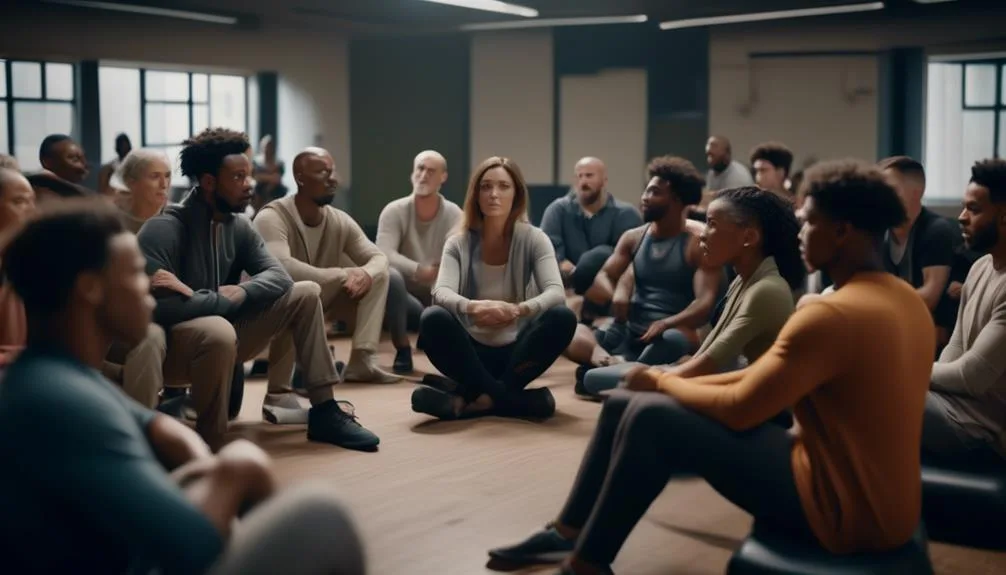Are you tired of feeling like your conversations could use a little more depth? Want to step up your communication game and connect with others on a whole new level? Well, it's time to master the art of active listening.
This essential skill can transform your interactions, allowing you to truly understand others, create meaningful connections, and build trust. But how exactly do you become an active listener?
Stay tuned as we uncover the techniques that will take your communication skills to the next level.
Key Takeaways
- Active listening is a vital skill in effective communication and is often referred to as the measurable dimension of empathy.
- It involves listening for total meaning, responding to feelings, and noting all verbal and nonverbal cues.
- Active listening promotes positive relationships, reduces conflicts, and enhances understanding between individuals.
- It is beneficial in various contexts, including counseling, the workplace, and written communication.
Understanding the Importance of Active Listening
Understanding the importance of active listening is crucial for developing effective communication skills and fostering meaningful connections with others. In personal relationships, active listening brings numerous benefits. It provides a safe and empathetic space for the speaker, fostering trust and enhancing the quality of communication and understanding.
Active listening promotes positive relationships and reduces conflicts, leading to healthier and more fulfilling connections. Additionally, active listening techniques can be applied to written communication, even in text conversations. Techniques such as paraphrasing, asking open-ended questions, and using nonverbal cues can improve understanding and enhance communication effectiveness in written exchanges.
Applying Active Listening in Various Settings

Applying active listening techniques in various settings allows individuals to cultivate stronger connections and foster effective communication. By actively listening, you can navigate conflicts and provide better customer service.
- Active listening in conflict resolution: When conflicts arise, active listening helps to deescalate the situation by showing empathy and understanding. By listening attentively to each party's perspective, you can uncover underlying concerns and work towards a resolution that satisfies both sides.
- Active listening in customer service: In customer service, active listening is crucial for understanding customers' needs and providing appropriate solutions. It involves giving your full attention, asking clarifying questions, and paraphrasing to ensure accurate comprehension. Active listening demonstrates empathy and builds trust, leading to satisfied customers and positive interactions.
Developing Essential Active Listening Skills

Developing essential active listening skills is crucial for effective communication and building strong interpersonal relationships. By engaging in active listening exercises, you can enhance your ability to truly understand and connect with others.
The benefits of active listening are numerous. It provides a safe and empathetic space for the speaker, fostering trust and creating a stronger bond. Active listening also enhances the quality of communication and understanding between individuals, promoting positive relationships and reducing conflicts.
Whether in personal or professional contexts, active listening is a valuable skill that can lead to calmer behaviors and increased success. By practicing active listening techniques, such as paraphrasing, asking open-ended questions, and using nonverbal cues, you can develop these essential skills and reap the benefits in your interactions with others.
Training Techniques to Enhance Active Listening Abilities

To enhance your active listening abilities, it's important to incorporate training techniques that focus on developing key skills and strategies for effective communication. Here are three training exercises that can benefit you in counseling:
- Role-playing scenarios: Practice active listening skills by engaging in simulated counseling sessions. This allows you to experience different situations and hone your ability to listen attentively and respond empathetically.
- Guided imagery exercises: Use visualization techniques to enhance your empathic listening skills. Imagine yourself in the speaker's shoes, experiencing their emotions and thoughts. This exercise helps you cultivate greater empathy and understanding.
- Journaling activities: Reflect on your personal listening habits by writing in a journal. Explore your strengths and areas for improvement when it comes to active listening. This self-awareness can help you identify patterns and make conscious efforts to enhance your listening skills.
Additional Resources for Practicing Active Listening

As you continue your journey to enhance your active listening abilities, it's essential to explore additional resources that can provide valuable support and guidance in practicing this crucial skill.
One valuable resource is the availability of active listening exercises. These exercises offer practical scenarios that allow you to apply your active listening skills in a controlled and structured manner. Engaging in these exercises helps you improve your ability to listen for total meaning, respond to feelings, and note all cues.
Another important aspect of active listening is the importance of empathy. Understanding and empathizing with the speaker's thoughts and emotions is key to effective active listening. By practicing active listening exercises, you can develop and strengthen your empathic abilities, which are essential in building rapport, trust, and understanding in your interactions with others.
Frequently Asked Questions
How Can Active Listening Benefit Personal Relationships Outside of Counseling or the Workplace?
Active listening techniques can benefit personal relationships outside of counseling or the workplace by fostering trust, improving communication, and reducing conflicts. By truly listening and empathizing, you can create a safe and supportive environment for meaningful connection.
What Are Some Common Barriers to Active Listening and How Can They Be Overcome?
To overcome barriers to active listening, employ strategies like self-awareness, suspend judgment, and stay focused. Use reflective questions and open-ended prompts to encourage deeper conversation and understanding.
Are There Any Specific Techniques or Exercises That Can Help Improve Active Listening Skills?
To improve your active listening skills, try practicing specific techniques and exercises. Engage in role-playing scenarios, use guided imagery exercises, journal to reflect on your listening habits, participate in group discussions, and practice mindfulness to enhance present-moment awareness.
Can Active Listening Be Applied to Written Communication, Such as Email or Text Conversations?
Yes, active listening can be applied to written communication, such as email or text conversations. Pay attention to nonverbal cues, like tone and punctuation, and use techniques like paraphrasing and asking open-ended questions to enhance understanding and communication effectiveness.
Are There Any Online Courses or Resources Available for Individuals Interested in Learning More About Active Listening?
Online courses and resources abound for those seeking to improve their active listening skills. These include techniques, exercises, and strategies for overcoming barriers in written communication and personal relationships. Expand your understanding with these valuable resources.
Conclusion
In conclusion, mastering the art of active listening is crucial for improving communication skills and deepening connections with others.
By actively engaging in conversations and creating a safe and empathetic space, you can foster trust and understanding in your relationships.
For instance, imagine a counseling session where a client opens up about their struggles with anxiety. Through active listening, the counselor not only hears their words but also empathizes with their emotions, leading to a more effective therapeutic experience.
By honing your active listening skills, you can transform conversations and become a more attentive and insightful listener.

